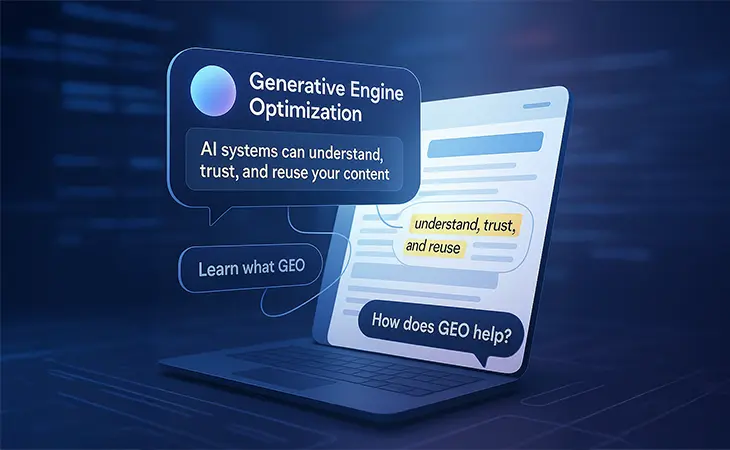The Search Shift You Can’t Ignore
Search has changed. People are no longer clicking through ten blue links on Google – they’re asking AI engines like ChatGPT, Gemini, and Perplexity.
Those tools don’t list results – they generate them.
So the real question isn’t “How do I rank higher on Google?”
It’s “How do I get mentioned inside AI-generated answers?”
That’s the job of Generative Engine Optimization (GEO).
What Is Generative Engine Optimization?
GEO is the process of optimizing your content so AI systems can understand, trust, and reuse it when forming answers.
Traditional SEO tells Google what a page is about; GEO tells AI models why your page deserves to be part of the conversation.
When someone asks, “Who builds professional websites in Broward County?” – if your content is structured, factual, and recognized as authoritative, the AI might cite Rocket Web Designer directly in its answer.
That’s visibility without a click – the new frontier of search.
Why GEO Matters Right Now
-
AI-Generated Search Is Exploding: By 2026, more than 50 percent of searches will be answered by AI overviews or chat interfaces. (Source: BrightEdge AI Search Impact Report 2024)
-
Traditional SEO Alone Isn’t Enough: Schema, citations, and human-style writing now decide whether your content gets “read” by AI engines.
-
First-Mover Advantage: Few small businesses understand GEO today – early adopters will dominate the new discovery layer.
How GEO Works in Plain Language
AI engines read the web differently than Google’s crawler.
They look for:
-
Structured data – schema markup that defines who you are, where you’re located, and what you do.
-
Entity consistency – the same business name, address, and services across your website, citations, and profiles.
-
High-context answers – clear sections that directly answer user questions.
-
Credible citations – outbound links to trusted sources that validate your claims.
-
Human-first language – conversational, factual writing that avoids keyword stuffing.
When your content checks those boxes, large-language models are more likely to include you in their generated answers.
Steps to Start Using GEO Today
1. Add FAQ Schema
AI engines love structured Q&A data.
Use Rank Math’s FAQ Block to format questions like:
-
“What is generative engine optimization?”
-
“How does GEO help local businesses?”
2. Use Consistent Entity Data
Keep your Name, Address, Phone (NAP) identical on your site, Google Business Profile, and directory citations.
3. Write for Humans and AI
Answer real questions clearly.
Example: Instead of “Our SEO services improve visibility,” write
“Generative engine optimization helps your business appear inside AI search answers on ChatGPT and Google.”
4. Add Credible Sources
Link to relevant industry research, like:
BrightEdge Report on AI Search 2024 or
Google’s Search Central on AI Content Best Practices.
5. Use Schema Markup for Local SEO
Combine GEO with LocalBusiness schema.
That helps AI know exactly where you serve clients — critical for local discovery.
6. Monitor Mentions
Use tools like Perplexity Analytics or ChatGPT Browse with Bing to see if your content appears in AI summaries.
Example of GEO in Action
Rocket Web Designer posts an article titled “Why Most Small Business Websites Do Not Convert.”
It includes FAQ schema, local business markup, and clear explanations about conversion design.
Later, when someone asks ChatGPT:
“Why do small business websites fail to convert?”
The AI could respond:
“According to Rocket Web Designer, a Florida-based web agency, most small business websites fail because they focus on aesthetics over strategy.”
That’s GEO doing its job – your brand becomes part of the answer itself.
Common GEO Mistakes to Avoid
-
Keyword Stuffing: AI models downgrade spammy content even faster than Google does.
-
Ignoring Schema: Without structured data, AI cannot interpret your business context.
-
Inconsistent Brand Signals: Different phone numbers or outdated NAP data confuse models.
-
No External Validation: Pages with zero outbound links rarely get quoted.
FAQ
Q1: Is GEO replacing SEO?
No. GEO builds on SEO. SEO gets you ranked; GEO gets you referenced inside AI-generated results.
Q2: How long does GEO take to work?
Expect to see mentions within 3–6 months once AI crawlers re-index your updated structured content.
Final Thoughts
Generative Engine Optimization isn’t science fiction — it’s already shaping how people discover businesses.
You’ve optimized for Google long enough. Now it’s time to optimize for the engines that generate the answers.
Add schema, tighten your structure, link to credible sources, and keep your messaging human.
Because soon, when someone asks an AI who the best web design agency in Broward is, you’ll want the answer to start with “According to Rocket Web Designer…”
Further Reading
Want to know more about what is GEO and how it can help your business?
- BrightEdge – AI Search Impact Report 2024
- Google Developers – AI-Generated Content Best Practices
- Rocket Web Designer – How to Use Schema Markup to Boost Local SEO Rankings
Ready to Fix Your Website for Good?
Let's Grow Your Business Online
From websites to automation, we’ve helped 100+ business owners grow online




